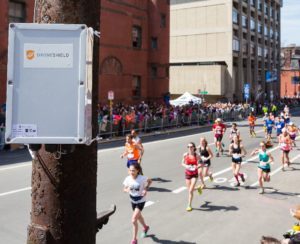
DroneShield, a Virginia-based UAV detection company, went public on the Australian Securities Exchange last week. Australian venture-capital group Long Hill LLC acquired the firm in May, although the comrpany will retain a stateside satellite office in Herndon, Va.
In addition to planning the IPO, Long Hill is in the process of raising an investment round of $5.2 million USD. After completion of the April 1 exchange agreement between the founders — Brian Hearing and John Franklin – and the new Australian company, DroneShield’s co-inventors retain 45 percent of the stock while Long Hill (now operating as DroneShield LLC) will own 55 percent.
According to DCInno, DroneShield offered 35 million shares in a bid to ascend to its seven-figure goal. While still an American company, DroneShield raised $1.15 million in a $150,000 seed round and $950,000 convertible debt round.
The company’s primary product uses acoustic technology to detect incoming drones from up to 150 yards and sends emails or text messages to a monitoring service. Prisons have started using the product to stop drones from delivering contraband such as cell phones of drugs to prisoners.
DroneShield proved that it could also operate in a noisier, less stable environment when it deployed detectors at the2015 and 2016 Boston Marathon. The entire marathon route had been declared a “no-drone zone” by city officials.
Hearing and Franklin will continue to maintain operational updates from their D.C.-based office while ICMI Technologies of Herndon will continue to manufacture the company’s anti-drone sensor arrays.
In DroneShield’s new prospectus, market experts Frost & Sullivan paint a bright future for the company.
“Systems for detecting and negating small, commercial drones are being developed globally, but a few companies, like DroneShield, have a head start.”
“Drone detection is a nascent industry, and DroneShield is one of the early movers in it. There is a limited number of drone-detection solutions that are readily commercially-available to end-users in the market and are credible, effective and cost-effective,” a DroneShield report added.
“Because of the lack of solutions to the pervasive threat of commercially-available drones around the world, DroneShield is experiencing substantial inbound demand for its products.”
Jason is a longstanding contributor to DroneLife with an avid interest in all things tech. He focuses on anti-drone technologies and the public safety sector; police, fire, and search and rescue.
Beginning his career as a journalist in 1996, Jason has since written and edited thousands of engaging news articles, blog posts, press releases and online content.
Email Jason
TWITTER:@JasonPReagan
Subscribe to DroneLife here.